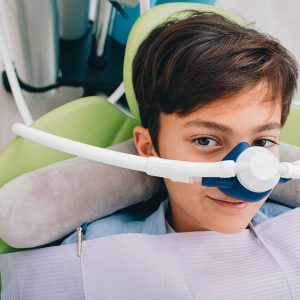Can my child be given some type of Sedation to make his/her treatment easier?
Dental visits can be anxious for some children, especially if they need a dental procedure like a cavity filling or oral surgery. Sedation dentistry might be a good option for your child. Child sedation dentistry involves methods that help patients relax for dental procedures. We can also use mild sedatives to manage anxiety around visiting the dentist, dental phobia, low pain tolerance, physical handicaps, or strong gag reflexes. We’re here to walk you through the safe and effective options of sedation dentistry.

Sedation dentistry is endorsed by the American Dental Association (ADA) as a safe, effective way to manage anxiety and keep patients comfortable during treatment. We only use the safest, most effective sedatives at our office. We use sedatives most commonly for procedures like fillings, extractions, and root canals. Here are the offered options.
Nitrous Oxide Or “Laughing Gas” Dentistry
Nitrous oxide, also known as laughing gas, is a safe and mild anesthetic used in child sedation dentistry to manage anxiety in younger patients. Laughing gas has a mild calming and euphoric effect. Most patients feel “giggly” while under the effects. Your child is fully conscious during laughing gas sedation and the effects wear off almost immediately after removing the mask. Nitrous oxide is non-addictive, mild, easy to administer, and 100% safe. If your child feels particularly fearful or anxious about the dentist, nitrous oxide may be the best way to help them feel comfortable during the treatment process.
IV Sedation
Nitrous oxide is most effective for minor procedures, but your child may need IV sedation or general anesthesia for more extensive child sedation dentistry procedures. These are deeper forms of sedation in which your child will be only partially conscious or fully unconscious while under the effects. IV sedation will put your child to sleep but not fully unconscious. They will feel as if they are asleep during the procedure, but will still be able to respond to questions and requests. Your child can be brought back to consciousness quickly and will most likely not remember anything about the procedure afterwards. We normally use IV sedation for major dental procedures or for patients with special needs, children less than 4 years old, or children with severe anxiety around the dentist’s office.
